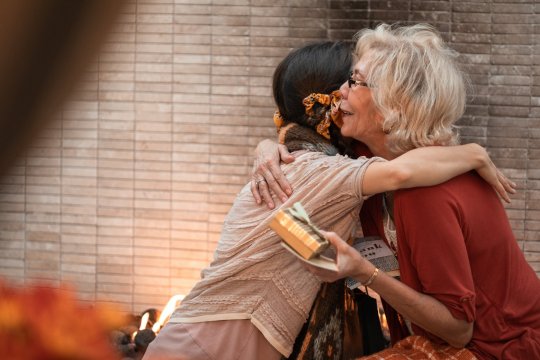A difficult topic: gratitude. ‘Harsh experiences may be a barrier to showing it’

A celebratory march was held in Warsaw – ‘Thank you, friends. Ukrainians to Poles’. Our reality has been filled with gratitude.
The researchers who study this phenomenon emphasise that it is one of the most important ways to build social relations. It creates bonds. It is the glue of social life – we can see it at the moment on the example of what is happening between Poland and Ukraine. It builds trust, allows people to work together. It can be an emotion; it can be a specific life attitude, defined by psychologist Robert Emmons, who works extensively on gratitude, as valuing a healthy lifestyle above all else. Gratitude is rooted in European culture: in myths, fairy tales, narratives, and in Christian tradition.
It is true that fairy tales are based on gratitude and reciprocity: the apple tree will give apples from the orchard because the protagonist watered it earlier...
Exactly. That is why it is present in our patterns of thinking and reacting. We expect it, but we also express it.
There are almost as many quotes about gratitude as there are about love. Winnie-the-Pooh: ‘Piglet noticed that even though he had a Very Small Heart, it could hold a rather large amount of Gratitude’. How does gratitude relate to the famous reciprocity principle?
The reciprocity principle often results from gratitude, although it doesn’t have to. Remember that in addition to gratitude understood in the context of emotions, there are also norms and rules of social life that strongly influence us. If someone says: ‘I’m grateful’ or ‘I’ll try to help in a similar situation’, it doesn’t at all imply experiencing gratitude at the level of emotions associated with empathy. Some researchers say that there are two kinds of gratitude: the more official one, understood as an attitude resulting from conforming to the rules of social life, a kind of real reciprocation, and the other one – a deep, genuine feeling that is experienced somewhere. It seems that not everyone is able to feel gratitude.
Are those people the ones we call egoistic?
Not necessarily. An egoist is someone who makes a rather conscious choice between an attitude of gratitude and ingratitude. I’m thinking more about the people we are helping right now and whose problems we’re struggling with, their mental states that make it very difficult to show gratitude. Experiencing PTSD, being in a stressful situation for an extended period of time are conditions that can freeze you emotionally. Sometimes, emotional dissociation is a form of defence mechanism, of survival in a traumatic situation. If we expect gratitude from a person who’s fleeing war, these harsh experiences may be a barrier to showing it. Because we don’t experience emotions in an isolated way, they are a result of those feelings that were experienced a moment ago. So it’s difficult to switch from ‘survival’ mode to ‘gratitude’ mode. That’s the type of story of ‘deferred gratitude’ I heard from one of my patients. She took in a refugee family from Ukraine. After a while, she became afraid because she couldn’t see any emotions in these people. She saw frozen, unemotional individuals. But she got a sign from them. Gratitude came after some time, and it was beautiful because these people did something that at that point fulfilled her needs. A renovation. She was very... grateful to them for that.
Exactly, I guess it’s also a challenge to meet the needs of the person you want to give back to.
Because gratitude isn’t just a reaction to a stimulus. The aforementioned Robert Emmons once confessed: I didn’t expect it to be such a complicated process. Very often gratitude takes time. It is also the kind of experience that is capable of making measurable changes in people’s lives. If it’s real and genuine – it has the power to change the situation of the person to whom we are actually giving back. I now recall one of my patients who felt great shame because one day she reproached her aunt for her lack of gratitude. The point was that she was helping her, but she didn’t get any response from the elderly lady. Auntie replied with tears: ‘But I’ve been praying for you every day that your latest project would be successful’. It was a difficult experience for my patient because she had to admit to herself that she saw gratitude only in material or verbal terms. Meanwhile, it also has a spiritual dimension.
Gratitude requires acknowledging your powerlessness. Employees of the aid centres for foreigners and volunteers say: sometimes the lack of gratitude is the only gesture through which they can show their autonomy and identity, that they still have influence on something. Would you agree with that?
Indeed, such a mechanism may occur. In order to be grateful, you must recognise that you are completely helpless in some area (sometimes your whole life). Recognising one’s own powerlessness can have far-reaching consequences in terms of coping mechanisms. Those who want and need to cope often do not accept powerlessness, and therefore gratitude. It’s very important, however, to maintain balance in terms of gratitude. Overly profuse thanks or expressions of gratitude that are disproportionate to the help provided may not unite, but on the contrary – divide. It’s best when there is a sense that we have similar emotional/material portions of giving and taking on both sides.
The mental well-being resulting from the sense of gratitude currently plays a significant role in the so-called positive psychology movement. It implies a generalised gratitude toward all life experiences, everything that one encounters in life. It results from research saying that people who are grateful in a real and genuine way are simply happier. They handle difficult situations better. More often in difficult situations they achieve what is called post-traumatic growth or post-crisis growth. They seem more resilient to adversity. Hence the great popularity of the so-called gratitude practices.
Who is gratitude practice for?
It is definitely a road to nowhere for people who have difficulty with experiencing gratitude. Just like some people don’t get satisfaction from meditation or mindfulness because it’s simply not a practice for them. People who experience emotions in a very shallow or low-intensity way will get nothing out of this gratitude practice. Rational people, who process the world cognitively rather than emotionally, won’t get much out of it.
When it comes to experiencing gratitude, we have quite a bit of gender variation. Women are more likely to experience it and express it. This is probably due to biological differences – for example brain structure, but also hormone levels and socialisation into social roles. Who is gratitude practice definitely for? For people for whom it has value (not everyone is/was socialised to feel that gratitude is important), who can see and understand the emotions of the person who gives. They will appreciate the purity of these emotions, the dedication, the empathy. Note that we’re not grateful when someone throws us money, makes a strange face and is emotionally unavailable. It’s different when we see some sort of sympathy, compassion on a person’s face. A condition for gratitude is the belief that someone understands the situation of the person in need of help. Practising gratitude increases the level of empathy, which is why it’s important to develop the attitude towards expressing it in children. And it doesn’t require any lecturing or talking. What is worth emphasising: gratitude is not a condition for helping. A common parenting mistake – we tell children: ‘if you helped a friend and they weren’t grateful, don’t do it again, it’s not worth it’. Conditional gratitude is not the right thing to do in my opinion. As a parent coach, I also see a rather unhealthy attitude in parents: they often expect their children to be grateful for everything. There’s a certain cult of gratitude in some families. For tea, for sandwich, for anything. Meanwhile, in this type of relationship, gratitude is a process that’s just happening all the time. It’s not necessarily about talking about this gratitude and constantly expressing it. Gratitude is a function of human love. We should remember that we really rarely help out of altruistic motives. Helping makes us feel better. Helping gives us strength. In view of this, if we know that our help is appropriate, but it doesn’t meet with gratitude – we should simply be grateful to ourselves. It will be a kind of ‘self-gratitude’: for strength, for resources, for goodwill and heart. It can be very rewarding.
Dr Magdalena Nowicka deals with psychology of individual differences. She is interested in how people influence their mood. She teaches psychology of individual differences, psychometry, and psychological interview at SWPS University.
Author: Krystyna Romanowska
Photo: pexels.com
The text was published in „Wolna Sobota” a magazine of „Gazeta Wyborcza” on 4 June 2022


